AI customer service software: Best tools for 2026
Discover how AI customer service software can help you deliver faster support, improve agent efficiency, and reduce operational costs.
Candace Marshall
Vice President, Product Marketing, AI and Automation
Última atualização em January 23, 2026
A complete guide to the 13 best AI customer service solutions of 2026
In 2026, 81% of consumers believe AI has become essential to modern customer service, according to the 2026 Zendesk CX trends report. Without a shadow of a doubt, artificial intelligence customer service is shaping the future of how organizations provide support.
There is an urgent need for businesses to incorporate AI in customer service in order to meet the rising consumer demand and maintain strong CX. Start today by learning about AI customer service software and all its features, benefits, and the best tools on the market.
More in this guide:
- What is AI customer service software?
- AI customer service software comparison chart
- The 13 best AI customer service software
- Features of AI customer service solutions
- Benefits of using AI customer support tools
- How to choose the right AI customer service solution
- Frequently asked questions about AI customer service
- Automate customer service with Zendesk AI
What is AI customer service software?AI customer service software refers to tools like intelligent routing, AI agents, and automated workflows that use artificial intelligence, machine learning (ML), natural language processing (NLP), and natural language understanding (NLU) to enhance and automate support interactions. |
AI customer service software comparison chart
Here’s a quick overview of 13 AI customer service companies of 2026.
All solutions made our roundup based on user reviews, affordability, and functionality. For more insights about your favorites, jump to the vendor profiles below.
| Software | Best for | Starting price | Free trial |
| Zendesk | Fast, top-quality omnichannel service | $19 per agent/month (billed annually) | 14 days |
| Chatfuel AI | WhatsApp integration | $23.99 per month | 7 days |
| Fin | Intercom integration | $0.99 per resolution | 14 days |
| Helpscout | Simplicity | $0 per month (for 100 contacts) | 15 days |
| Tidio | Flow builder | $32.50 per user/month | 7 days |
| Freddy AI | Multilingual support | $29 per agent/month | 14 days |
| Kustomer | Unified customer view | $89 per user/month | Unavailable |
| HappyFox Assist AI | Employee assistance | $1 per user/month | Contact sales |
| HubSpot | CRM integration | $9 per agent/month | Unavailable |
| Balto | Call assistance | Contact sales | Unavailable |
| Drift by Salesloft | Marketers | $2,500 per month (billed annually) | Available |
| Custify | Subscription-based services | Contact sales | Unavailable |
| Replicant | Contact centers | Contact sales | Available |
The 13 best AI customer service software
Here’s another look at the AI customer service software vendors we will discuss in this roundup.
1. Zendesk
Best for fast, top-quality omnichannel service

|
Starting price |
Free trial |
Key features |
|
$19 per agent/month (billed annually) Explore more Zendesk pricing plans. |
14 days |
|
Zendesk is the complete customer service solutionfor the AI era. Purpose built for CX, Zendesk’s AI customer service software provides customers with fast and personalized support through email, messaging, voice, and social media.
The unified support workspace displays a complete view of the customer, which frees agents from siloed customer data and multiple conflicting tools. In turn, customers are happier too, receiving incredibly fast responses that are always informed by context.
Zendesk’s AI agents take automation to the next level, with AI handing over 80% of customer interactions autonomously. This means that support teams are no longer worn down by routine questions already answered in the knowledge base. Instead, they can turn their attention to high-profile customer requests and more meaningful tasks. Connect your knowledge base and create your own customer service chatbot—no coding required.
With tools ranging from AI copilot and automated ticket routing to out-of-the-box reporting dashboards for business insights, there’s truly no limit to how Zendesk can optimize your customer service offerings.
|
Pros |
Cons |
|
|
What people are saying:
- "The interface is clean and well-organized, which makes it simple to manage multiple conversations across channels like email, chat, and social media all in one place. "
- "The ability to automate ticket routing, create detailed macros, and use triggers for repetitive workflows has significantly reduced our response time."
- "I also appreciate how easy it is to build custom reports and visualize them in dashboards—making it simple to track trends and share results across the organization."
Explore more Zendesk pricing plans.
2. Chatfuel AI
Best for WhatsApp integration
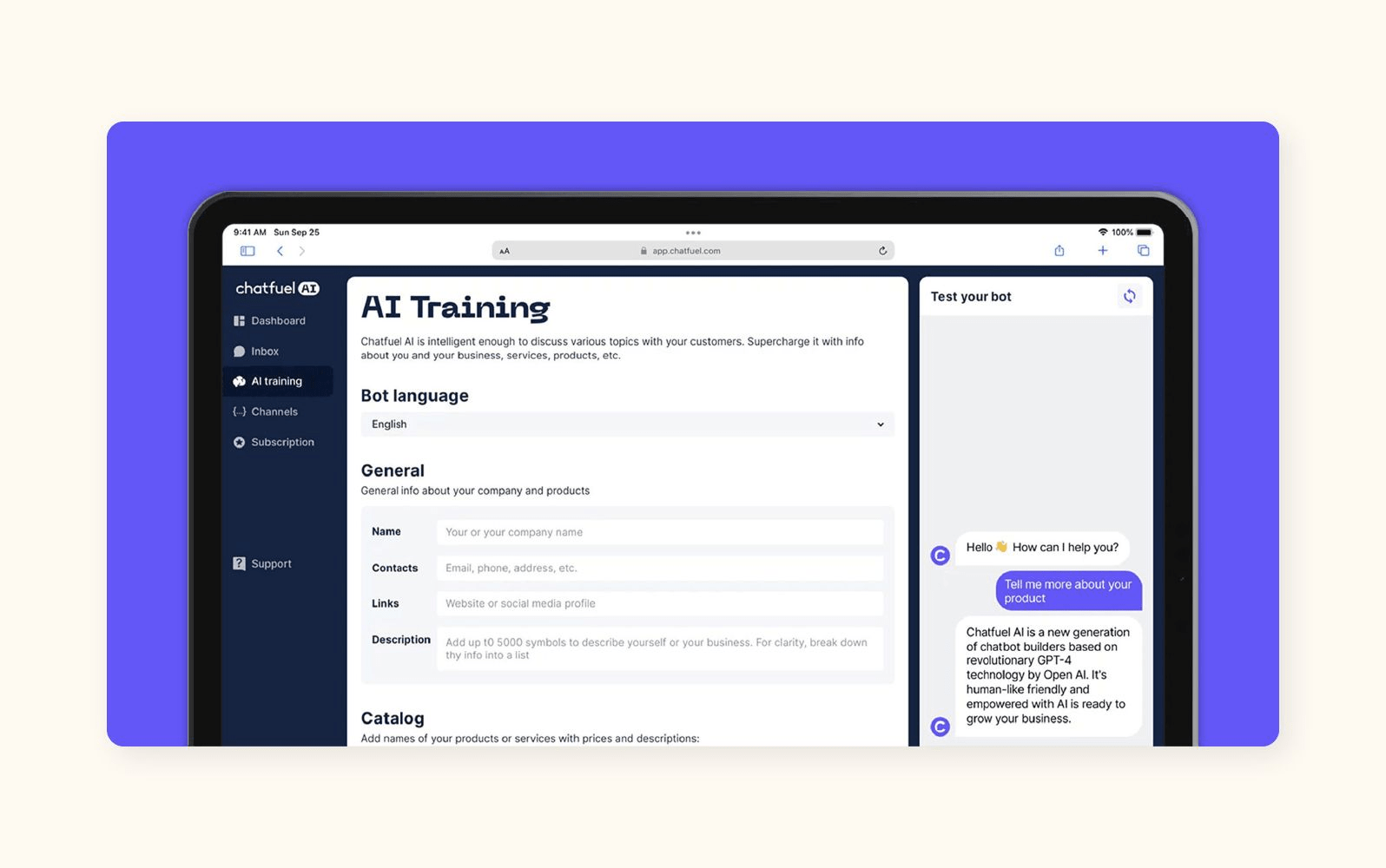
|
Starting price |
Free trial |
Key features |
|
$23.99 per month |
14 days |
|
Chatfuel AI offers a bot builder developed using a cascade of Llama-405B models (via Nebius AI studio). With the Flow builder, businesses can create automated conversation scenarios so the chatbot is able to share discounts and answer FAQs. Plus, the pre-made templates cover most common use cases and automations span across story replies and mentions to re-engagement messages.
The company’s main focus is its WhatsApp API, which allows agents to use ChatGPT within WhatsApp and send auto-replies. However, this comes at the higher cost of $39 for a Business subscription.
|
Pros |
Cons |
|
|
What people are saying:
- "Easy to customize flows & catch errors in the AI learning process."
- "Sometimes Chatfuel can be challenging to use if you don't have a developer."
- "Chatfuel will automatically increase your plan each month by default as your amount of "subscribers" increases."
3. Fin
Best for Intercom integration
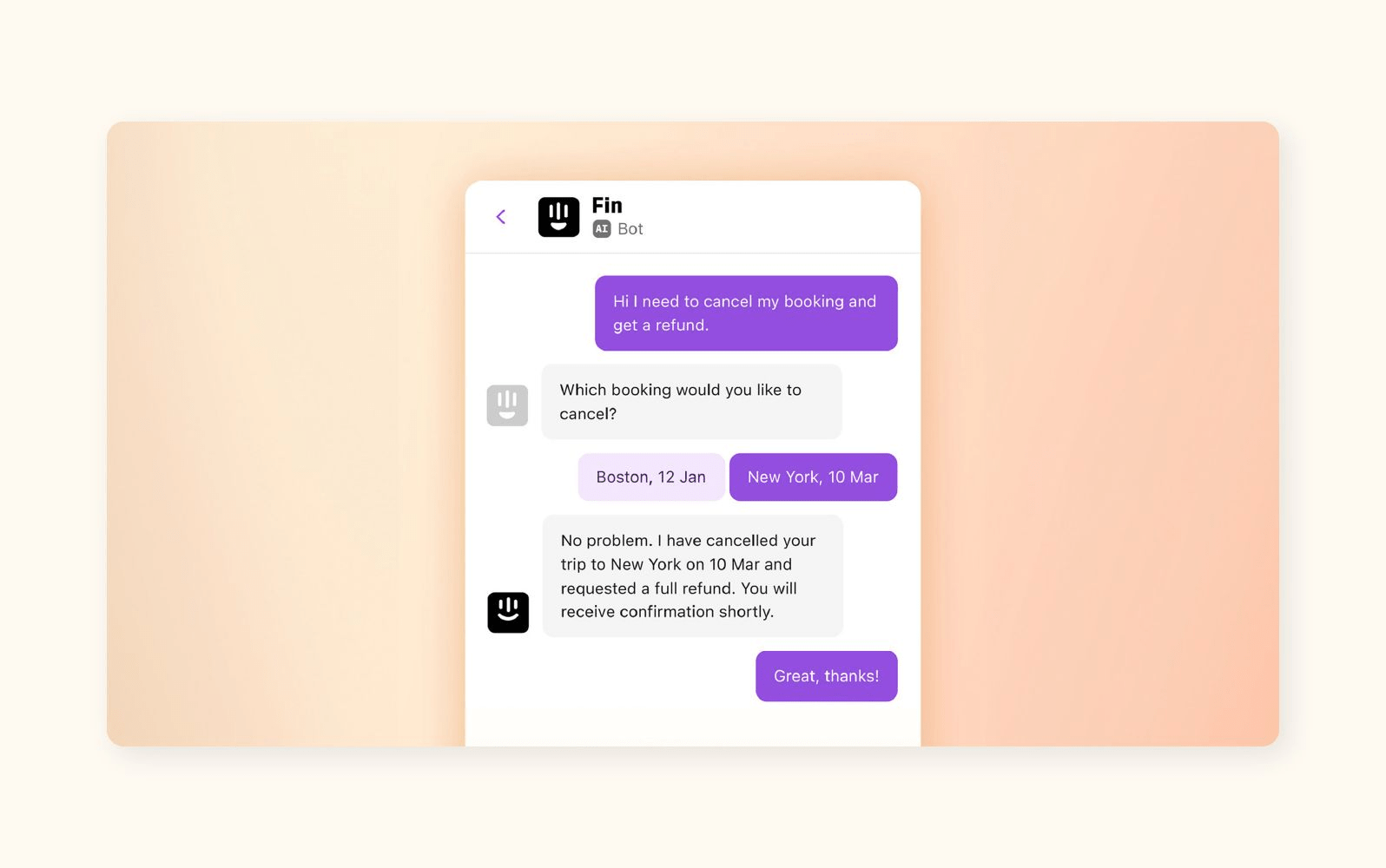
|
Starting price |
Free trial |
Key features |
|
$0.99 per resolution (billed annually) |
14 days |
|
Intercom’s AI customer service chatbot, Fin, can be customized to align with a company’s branding, all the way down to its name and tone. The bot requires minimal configuration and zero coding knowledge.
Fin is powered by OpenAI models alongside its own architecture, which enables it to answer customer questions without the help of a human agent. With its Fin AI Engine™, it retrieves data from help center articles, structured snippets, and more. Business leaders and management teams can leverage this tool to ease agent workloads through agent handoffs and automated follow-ups.
|
Pros |
Cons |
|
|
What people are saying:
- "Its ability to pull relevant information directly from our help center articles makes it easy to deploy without much setup or constant supervision."
- "Fin can struggle with complex, nuanced questions, occasionally providing inaccurate responses."
- "Compared to other AI chatbot solutions we’ve evaluated, Fin’s pricing feels high, especially for teams handling large ticket volumes."
4. Help Scout
Best for simplicity
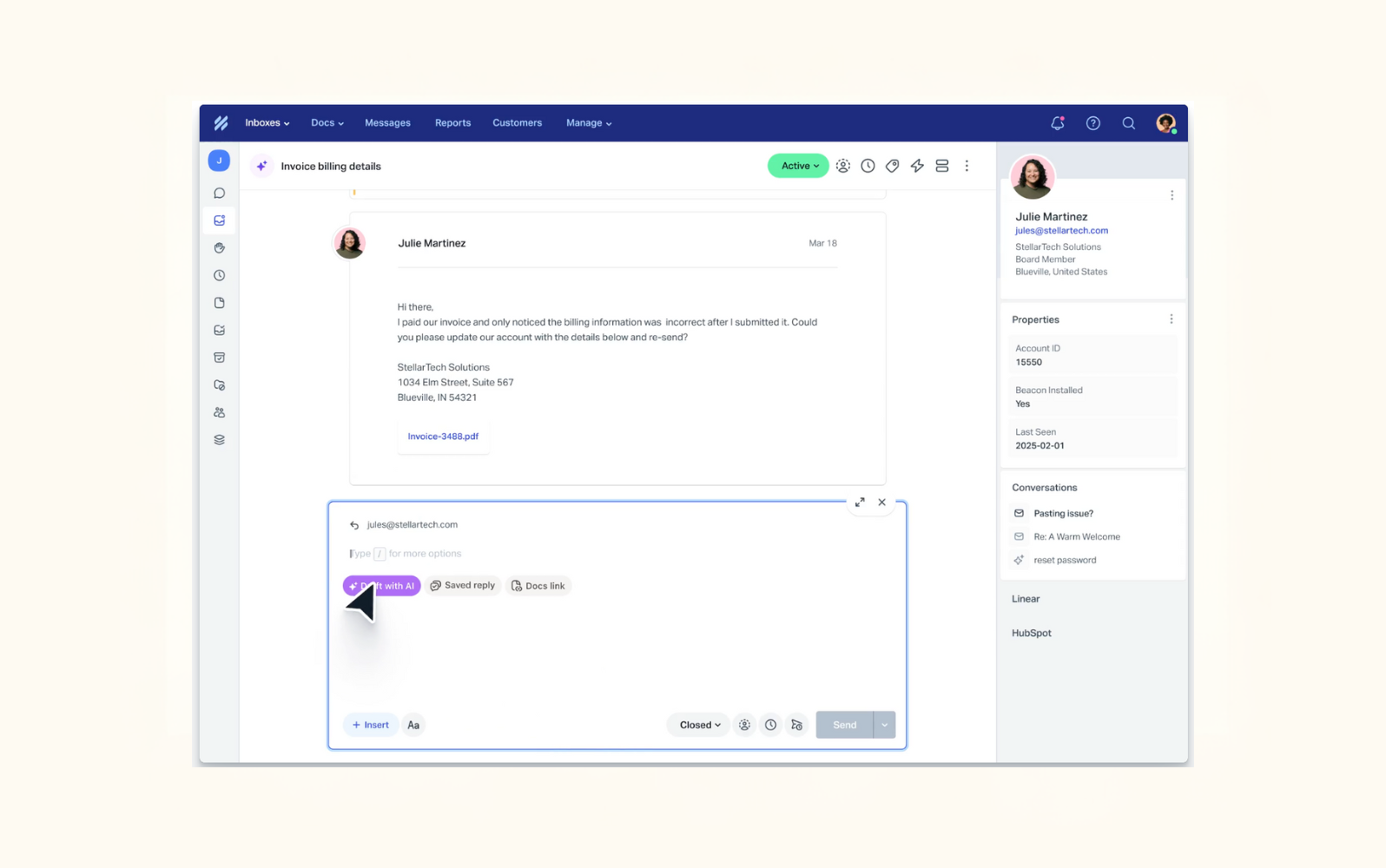
|
Starting price |
Free trial |
Key features |
|
$0 per month (for 100 contacts) |
15 days |
|
Help Scout is a customer support platform that prioritizes simplicity, a customer-first approach, and omnichannel interactions. With the goal of unifying support requests, Help Scout provides a single inbox where customer conversations can be viewed by the relevant agents. So, regardless of how a customer has got in contact (email, live chat, social media, or via the app), teams can always see a clear view of the interaction.
While not providing a fully fledged AI agent, Help Scout has many AI features to help with drafting replies and summarizing threads, and it can respond to customers directly in over 50 languages.
|
Pros |
Cons |
|
|
What people are saying:
- "The app has a shared inbox, that all conversations are shared by any individual in a firm."
- "Help Scout is work in progress, where multiple services are not yet automated."
- "Reporting can feel a bit limited at times, and more customization options for workflows would be helpful."
5. Tidio
Best for flow builder
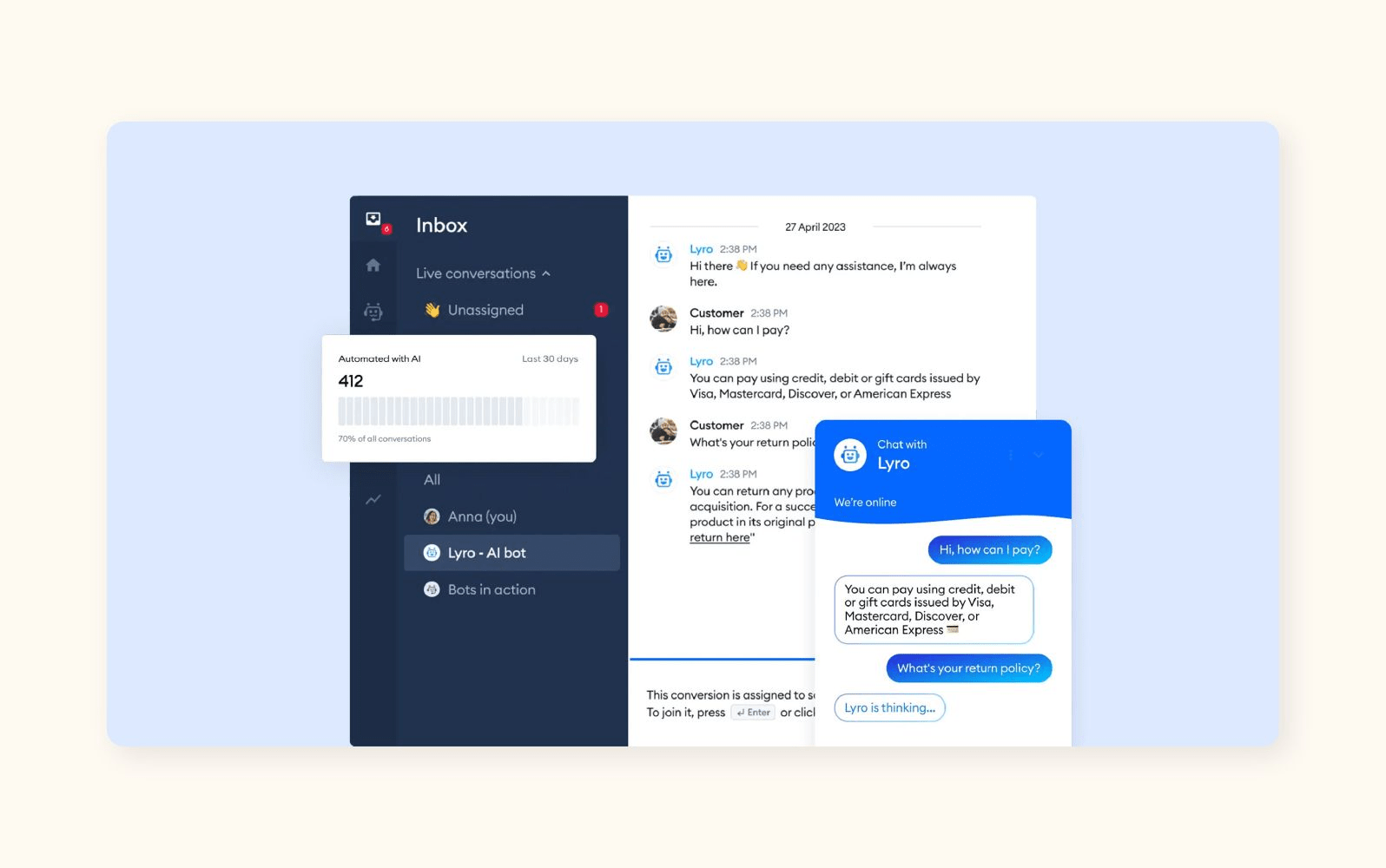
|
Starting price |
Free trial |
Key features |
|
$32.50 per user/month |
14 days |
|
Tidio’s AI agent, Lyro, can detect frequently asked questions, automate replies, identify support opportunities, and recognize user behavior to make relevant sales recommendations. Lyro is powered by Claude (Anthropic AI) and uses only content that you’ve connected to the chatbot. With natural language processing (NLP), the AI agent can understand customer questions and sentiment, and respond appropriately.
Lyro comes with template flows and can intelligently triage and route tickets to the most suitable agent. The AI Agent standalone plan starts at $32.50 per user/month and includes 50 AI conversations.
|
Pros |
Cons |
|
|
What people are saying:
- "The interface is clean and intuitive, making it simple for both beginners and experienced teams to get up and running quickly."
- "Some automation rules and chatbot flows take a bit of a learning curve to optimize."
- "Implementing AI chat features on lower plans could be nice."
6. Freddy AI
Best for multilingual support
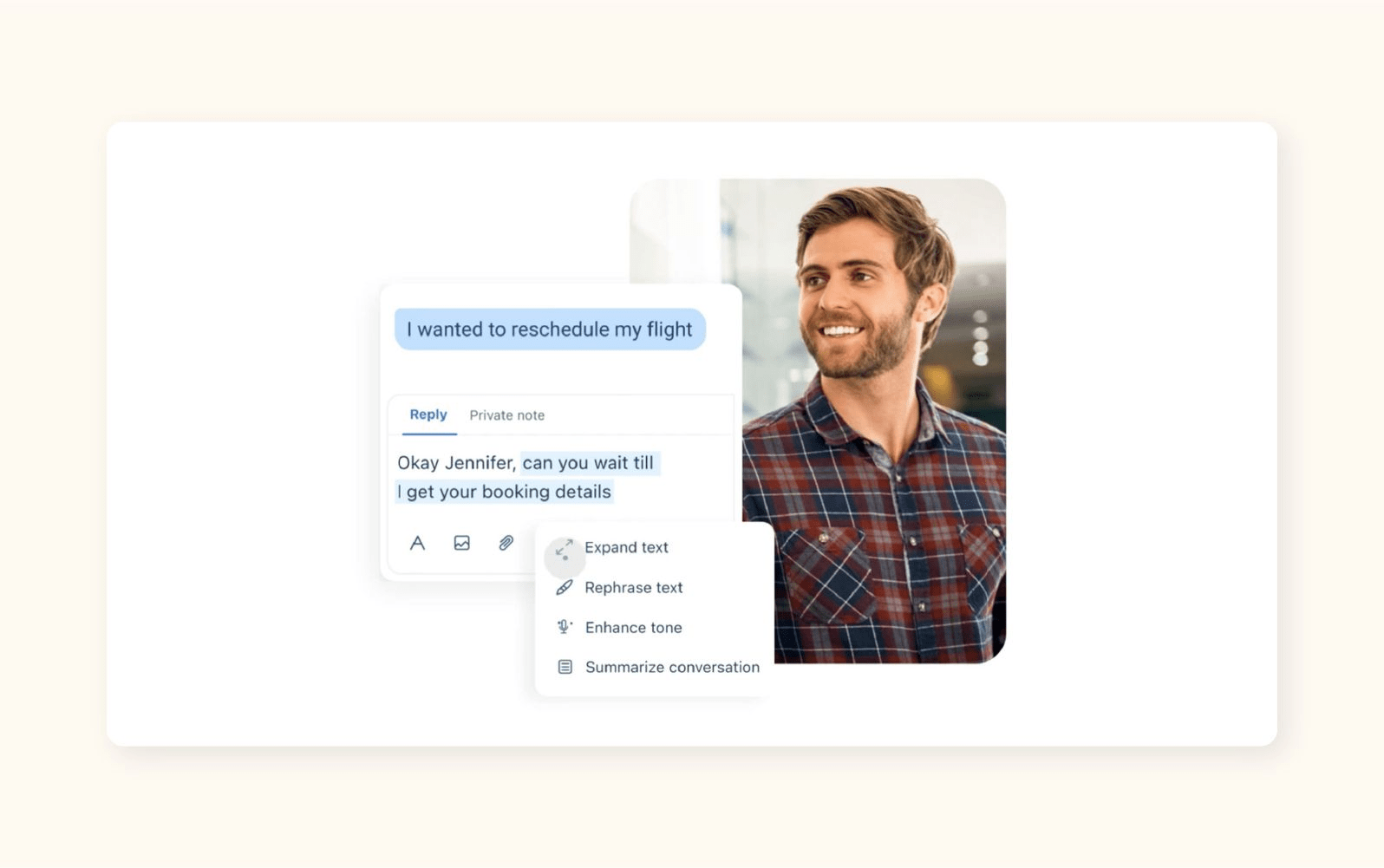
|
Starting price |
Free trial |
Key features |
|
$29 per agent/month (billed annually) |
14 days |
|
Freshdesk’s customer service software comes in the form of Freddy, an AI agent that offers omnichannel support. Using agentic AI, Freddy is able to take actions like providing key information, issuing refunds, and updating tickets. It supports over 60 languages and will hand over to a human agent when it encounters a problem it’s unable to answer effectively. The first 500 sessions using Freddy AI are included in the Pro plan and higher.
Aiding support agents in real time, Freshdesk’s Freddy Copilot drafts replies and summarizes customer queries. Billed as a 24/7 AI collaborator, the copilot provides employees with context and insights that contribute to improved team productivity. Freddy Copilot is available as an add-on, starting at $29 per month.
|
Pros |
Cons |
|
|
What people are saying:
- "The interface is very user friendly, and managing tickets is straightforward."
- "While Freshdesk is overall very effective, some advanced features are only available in higher-tier plans, which can be limiting for smaller teams."
- "Customization limits – Some features and workflows aren’t as flexible as you’d expect."
7. Kustomer
Best for unified customer view
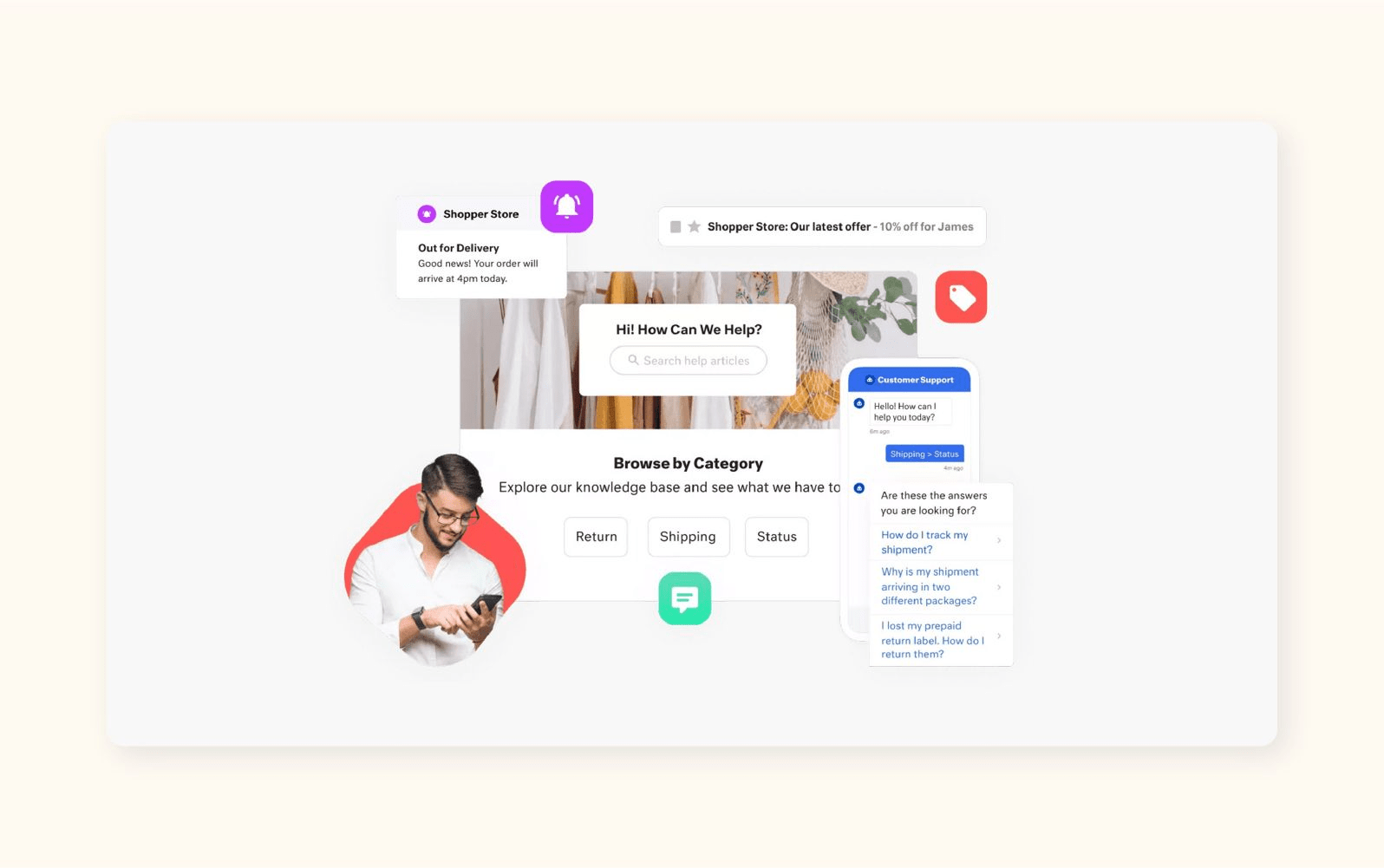
|
Starting price |
Free trial |
Key features |
|
$89 per agent/month (billed annually) |
Unavailable |
|
Kustomer’s AI agents take care of routine customer inquiries, responding in a human-like way and drawing on context from CRM and knowledge base data. They have the capacity to resolve 40% of customer requests without human input. When met with a complex request, the AI agent has the power to hand it over to a support agent so the customer receives a more tailored experience.
The unified platform is a hit with users as customer conversations are brought into one place, regardless of the channel they belong to. Customizable workflows and no-code setup are some other highlights of the software. Kustomer also offers conversational assistants to automate agent research, processes, and workflows (as a paid add-on).
|
Pros |
Cons |
|
|
What people are saying:
- "Kustomer brings all customer interactions into one easy-to-follow timeline, which makes it simple to see the full context of a customer’s history."
- "Kustomer can feel overly complex at times, with a steep learning curve for new users."
- "The reporting tools aren’t as intuitive or flexible as they could be."
8. HappyFox Assist AI
Best for employee assistance
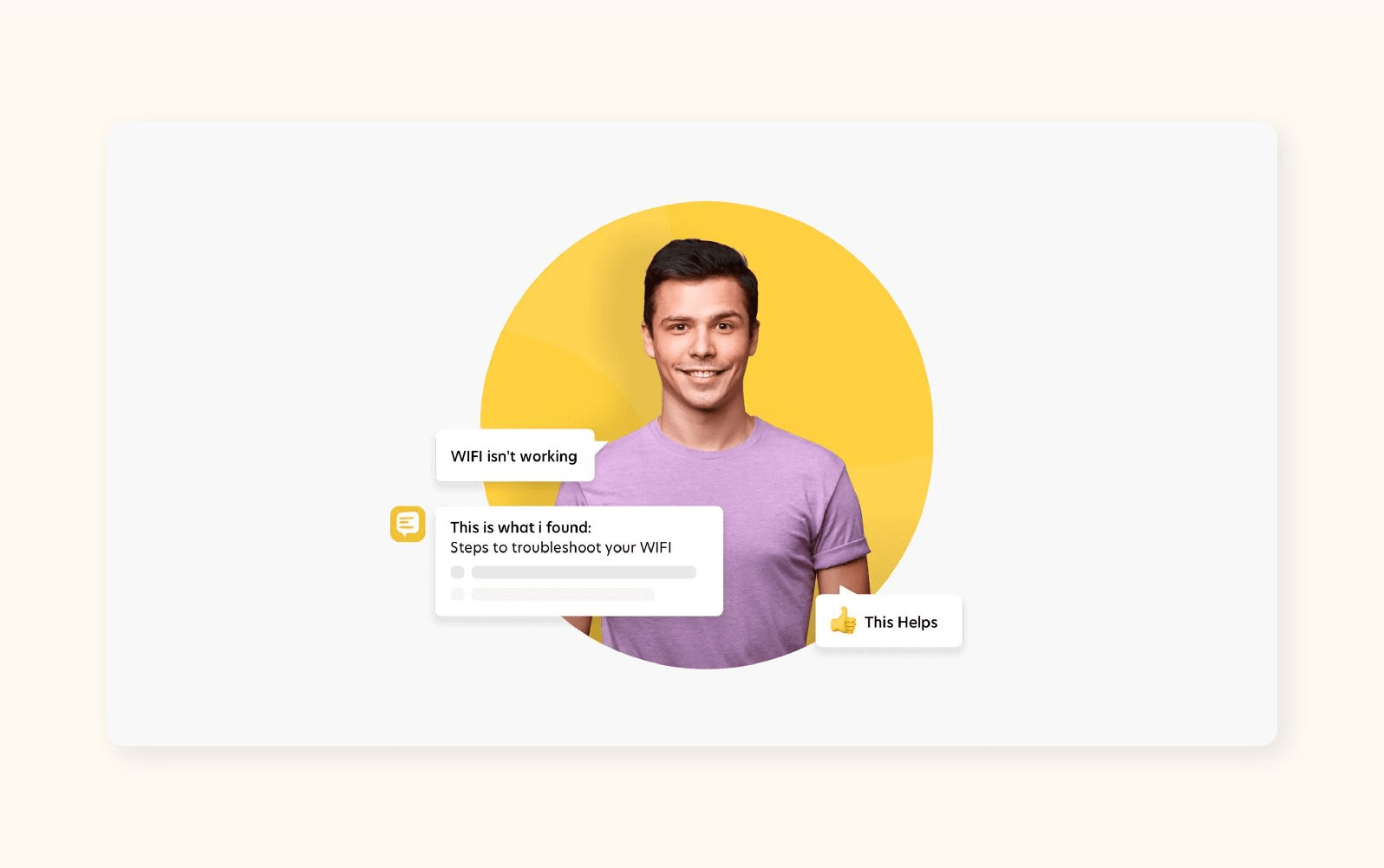
|
Starting price |
Free trial |
Key features |
|
$1 per agent/month (billed annually) |
Contact Sales |
|
Assist AI is a feature of HappyFox’s support software. The platform is designed for internal IT, HR, and operations teams and natively integrates with Slack and Microsoft Teams. Taking the hassle out of finding solutions, Assist AI answers employee questions directly within these collaboration platforms.
With purpose-built ML and NLP models, HappyFox’s Assist AI can detect employee intent and provide personalized answers. It also adds the human touch as it’s programmed to reply in a conversational tone. To access the most advanced conversational AI features, users need to subscribe to the Enterprise Plus plan.
|
Pros |
Cons |
|
|
What people are saying:
9. HubSpot
Best for CRM integration
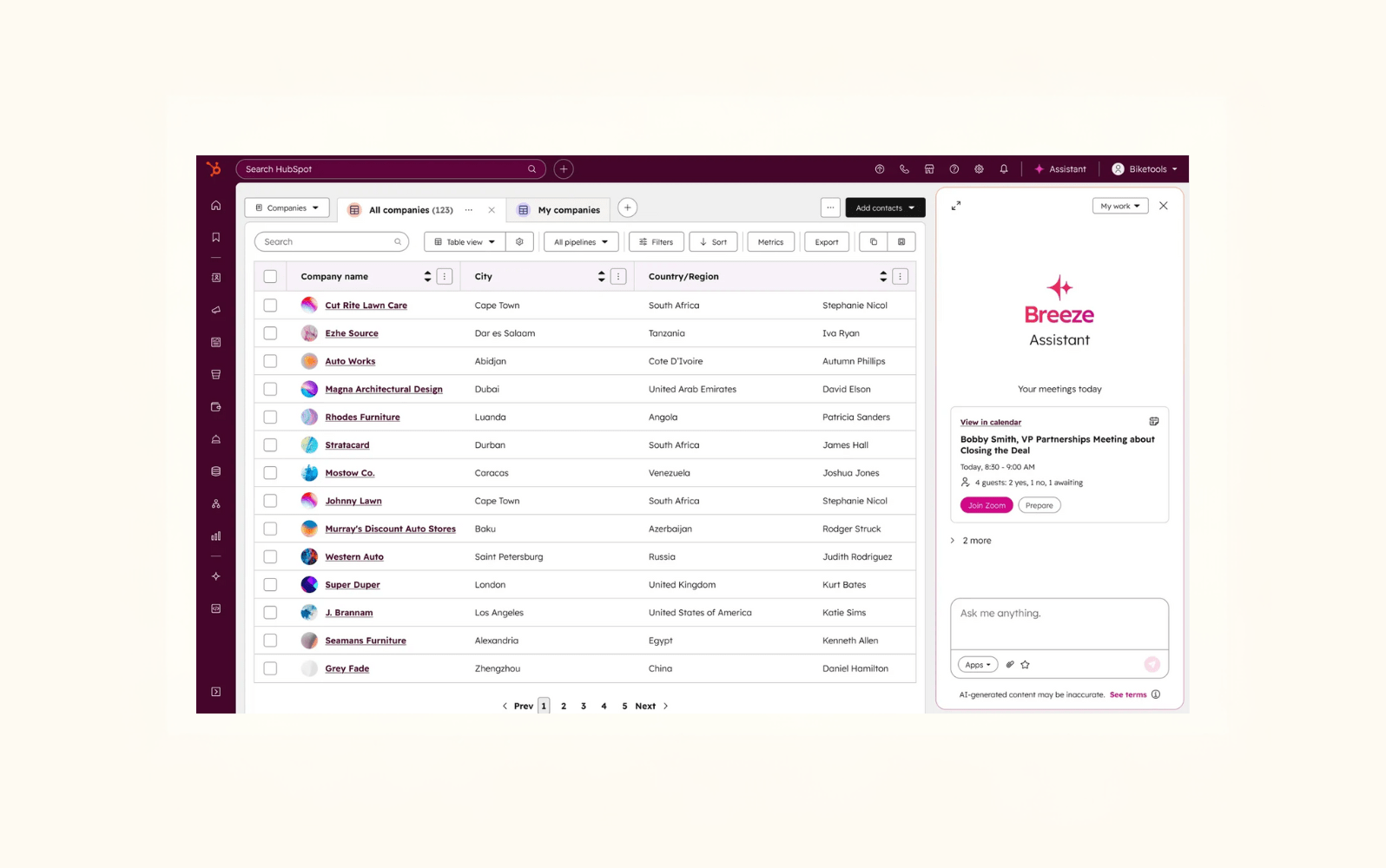
|
Starting price |
Free trial |
Key features |
|
$9 per agent/month (billed annually) |
Unavailable |
|
HubSpot’s Breeze is a collection of AI tools that are designed to help teams streamline systems and processes. One highlight is the AI customer agent that answers routine questions, guides visitors to the right places, and ultimately resolves 65% of conversations automatically. It works across channels, responding to queries made via chat, email, social media, and voice.
Within HubSpot’s broader Service Hub lies an AI-powered help desk that automates ticketing and support flows. As this software belongs to the HubSpot ecosystem, support teams can enjoy the CRM context that this connection brings.
Plans start at $9 per month, but note that customer agents are attached to a credit-based system, so you’ll need to purchase additional credits on top of your monthly or annual subscription.
|
Pros |
Cons |
|
|
What people are saying:
- "What I like best about HubSpot Service Hub is how seamlessly it integrates customer support, automation, and CRM tools into one unified platform."
- "While HubSpot Service Hub is great overall, some features feel limited unless you're on a higher-tier plan."
- "It's not as flexible or robust as specialized support platforms like Zendesk"
10. Balto
Best for call assistance
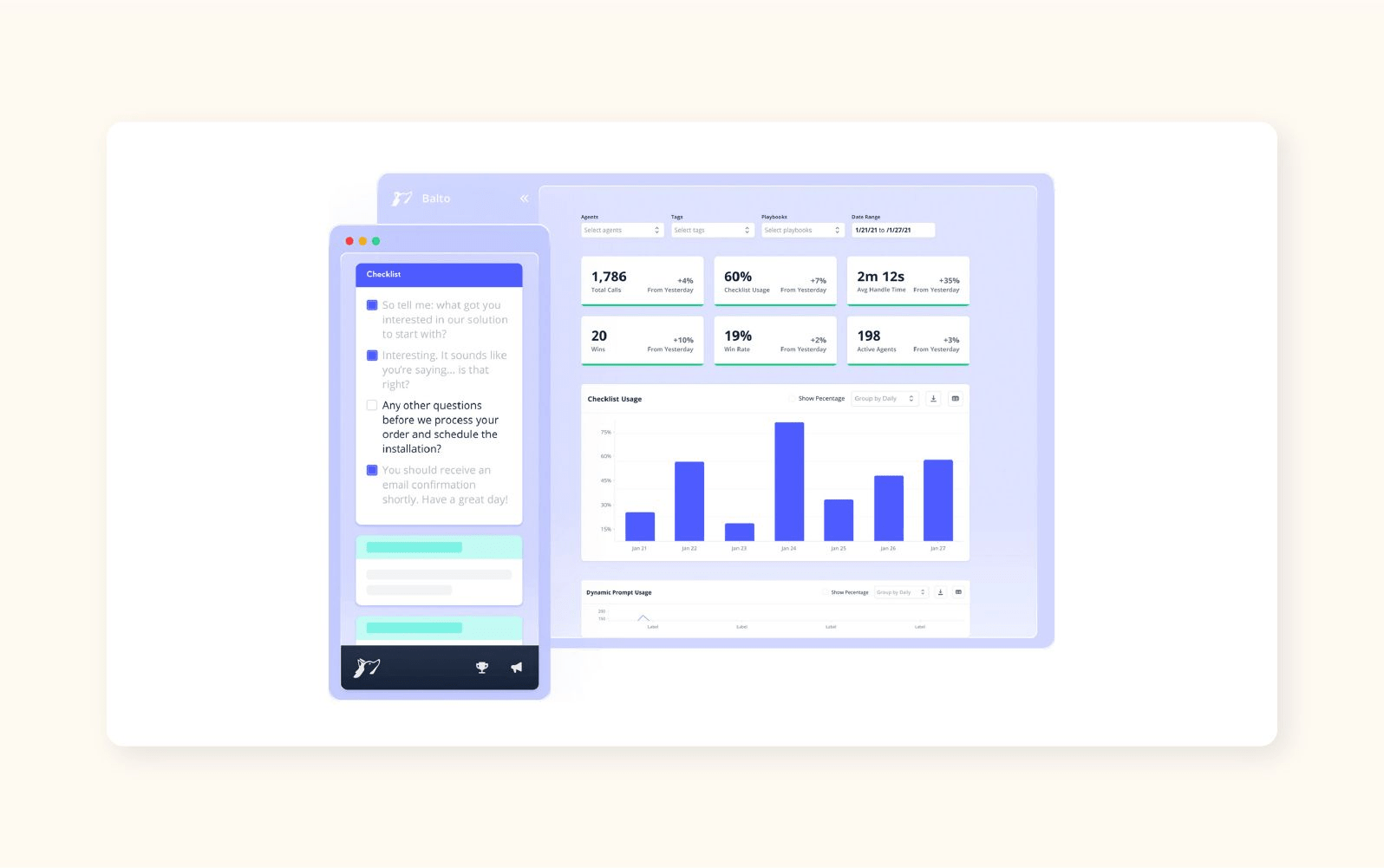
|
Starting price |
Free trial |
Key features |
|
Contact sales |
Unavailable |
|
Balto is an AI-powered platform for customer service agents that provides real-time live coaching, prompts, and general context during customer interactions. Balto’s Agent App is displayed on agent screens while they work, surfacing relevant CRM or knowledge base information as needed.
Assisting agents during calls, Balto generates live summaries and notes and syncs them to agent dashboards. Helping support teams improve, the platform shares insights and findings on agents’ conversations and customer sentiment. Unfortunately, Balto doesn’t have fixed and publicly available pricing, so you’ll need to contact sales to get a quote.
|
Pros |
Cons |
|
|
What people are saying:
- "The user interface is nice and clean, very responsive."
- "When there's a lot happening at once, having pop-ups or notifications can distract me from the flow of the conversation, making it harder to focus."
- "I like how it picks up the questions and lets you know what you have to say in order to stay compliant."
11. Drift by Salesloft
Best for marketers
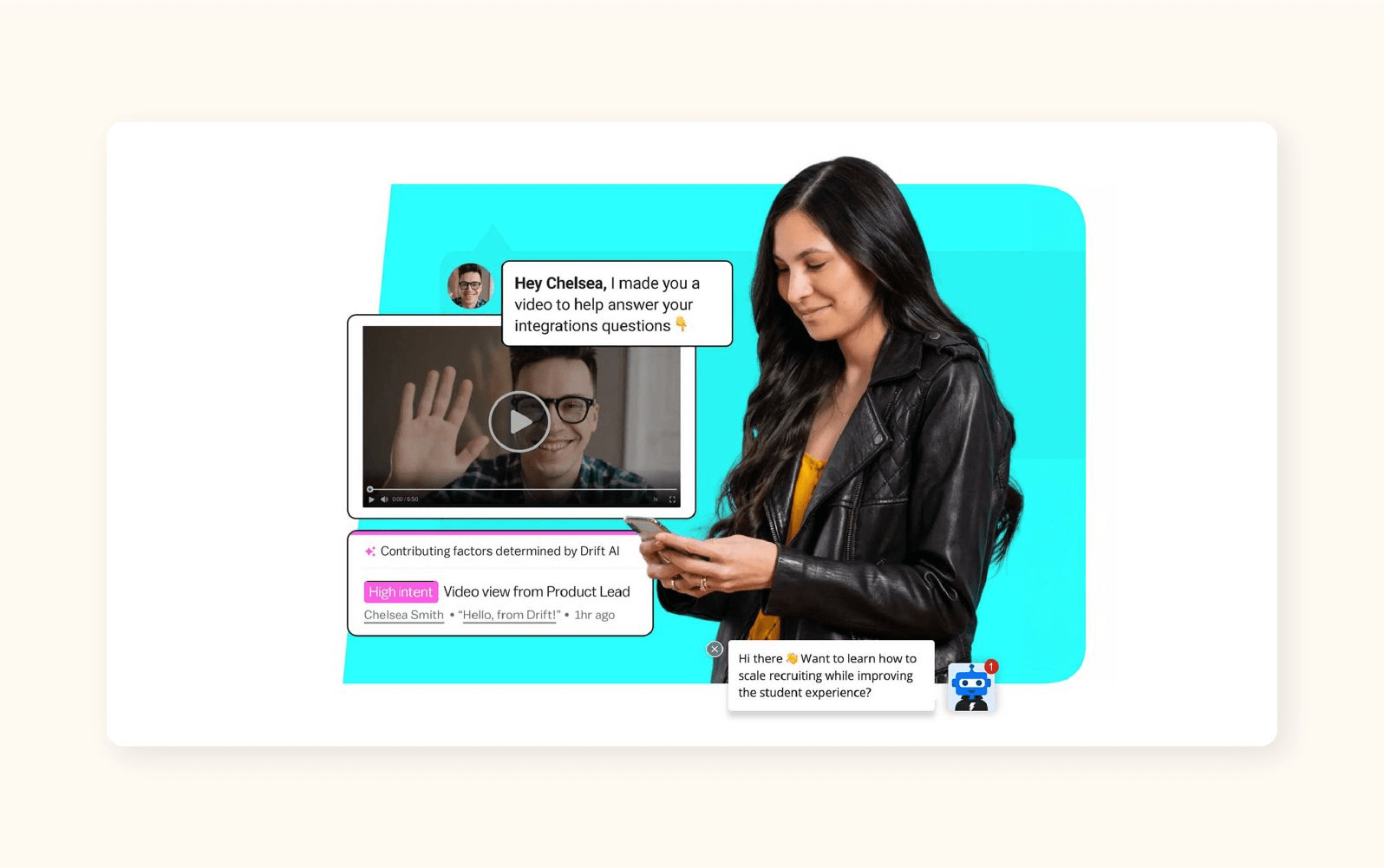
|
Starting price |
Free trial |
Key features |
|
$2,500 per month (billed annually) |
Available |
|
Salesloft’s Drift AI chat agent is designed for marketers with the goal of driving sales. It greets site visitors, fielding common questions and providing a personalized chat experience. Right away, Drift’s bot can adopt your brand’s voice and learn from past conversations and content on your website or blog to customize its outputs.
Another highlight is Drift’s visitor categorization. The AI can identify high-intent buyers and analyze their account data, including their company name and location, and calculate their engagement score. After this, the visitor information is routed into the seller workflow and labelled as a priority. This level of automation safeguards against lost opportunities and lead drop-off.
|
Pros |
Cons |
|
|
What people are saying:
- "I love that it allows us to have inbound conversations with prospects or customers."
- "Cost, training, initial setup and information is not always correct."
- "Initial setup is not easy. I think Drift could improve a lot on that part."
12. Custify
Best for subscription-based services
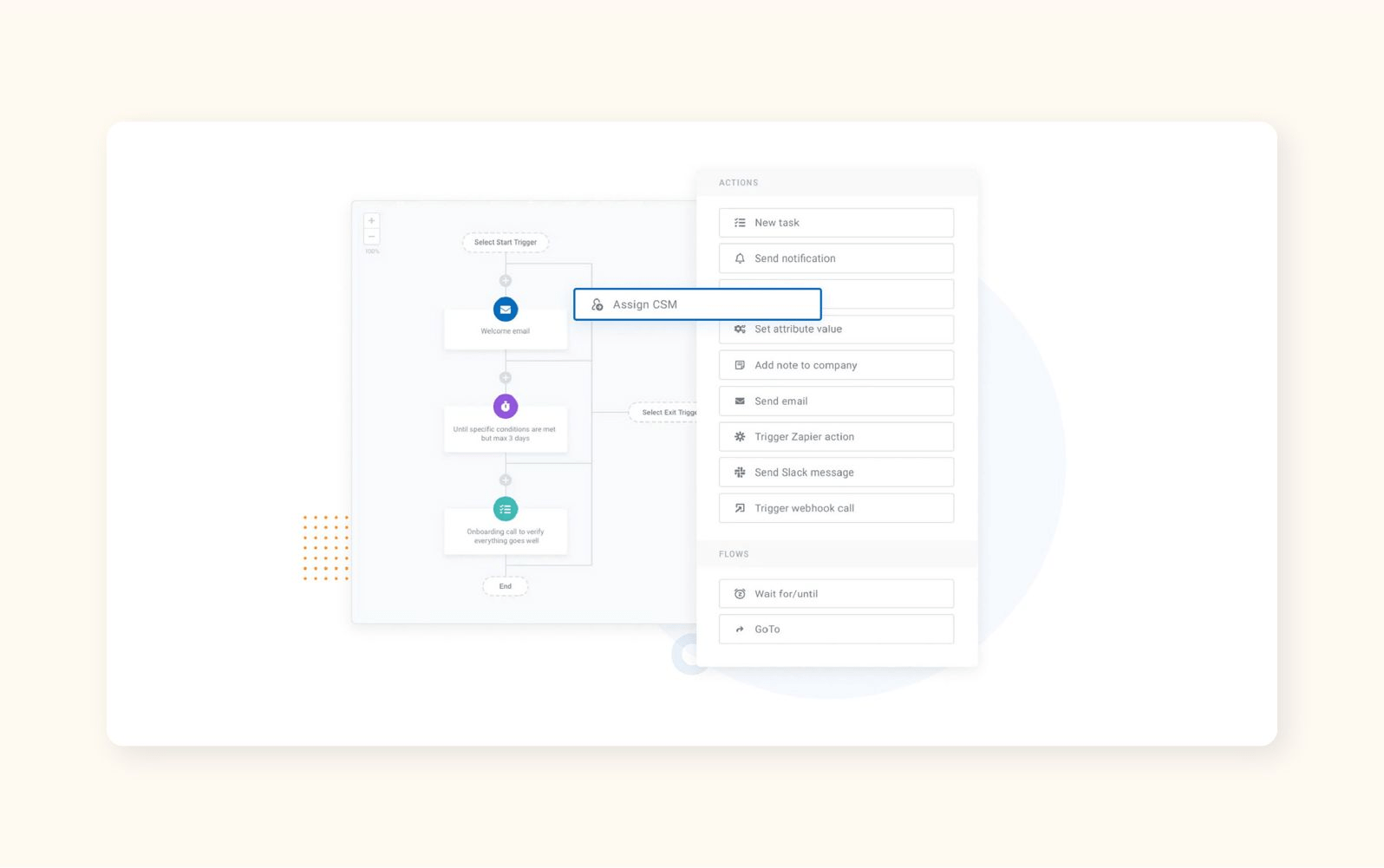
|
Starting price |
Free trial |
Key features |
|
Contact sales |
Unavailable |
|
Custify is a customer success platform for software as a service (SaaS) and subscription-based companies that are aiming to increase customer retention and revenue. While it can be used for customer service, with its self-service portal and automated workflows, the focus lies more on customer success since it aids in tracking customer life cycles, product adoption, and sales opportunity identification.
The platform can automate email communications, monitor the health of individual accounts, and track agent performance. It also integrates with third-party platforms including CRM and support tools.
|
Pros |
Cons |
|
|
What people are saying:
- "The interface is intuitive, the automation saves time, and the insights it delivers are incredibly valuable."
- "I'd also love to see stronger integrations and more robust options for collaboration across teams."
- "Implementaton of integrations such as the API requires technical knowledge."
13. Replicant
Best for contact centers
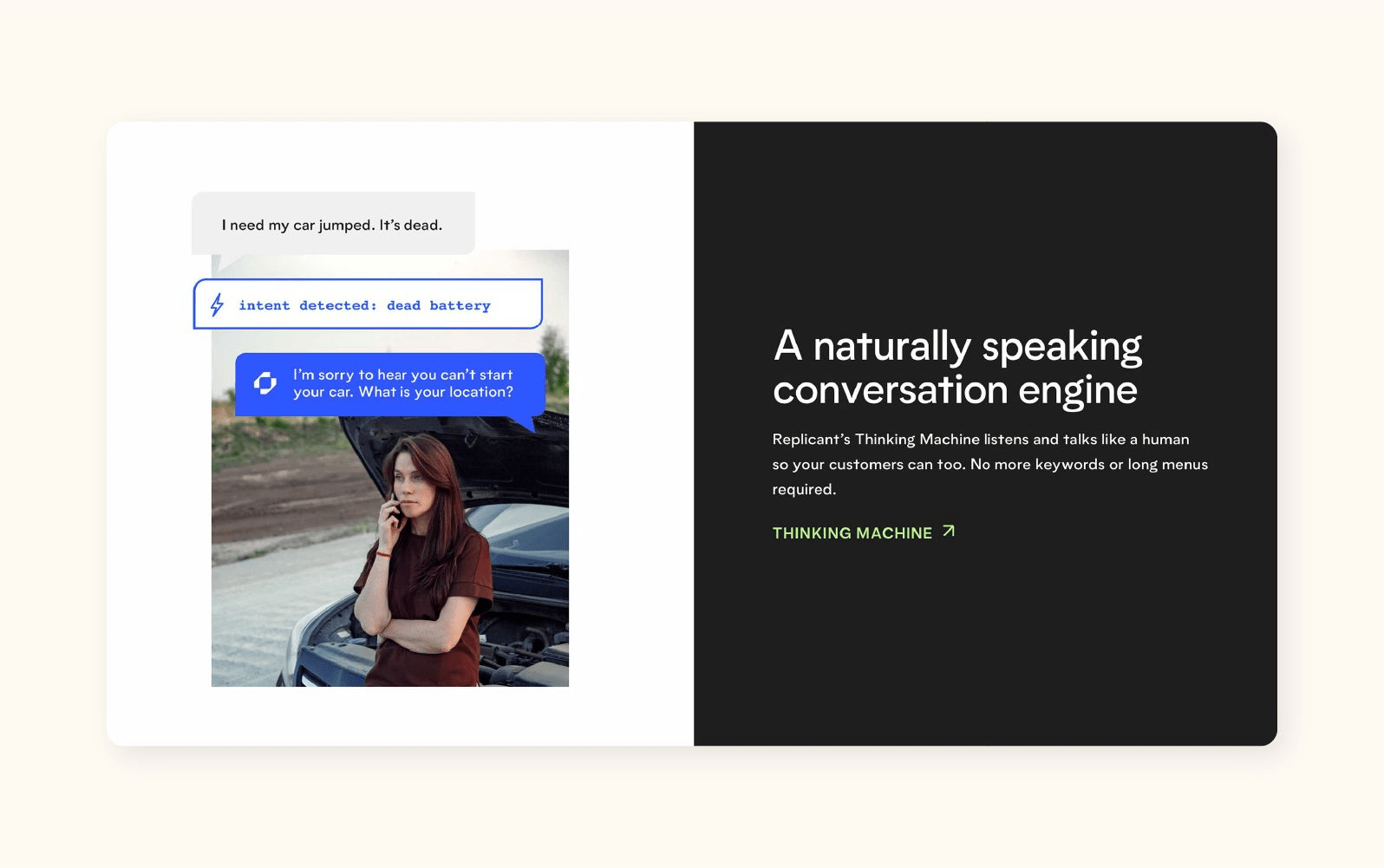
|
Starting price |
Free trial |
Key features |
|
Contact sales |
Unavailable |
|
Replicant is an automation software for contact center support teams. Reducing agent workload, AI voice and chat agents interact with customers in a conversational, natural way, even resolving requests independently. When met with a complex issue, Replicant’s AI agents hand over to the right person at the right time.
With an emphasis on voice calls and messaging, Replicant aims to streamline repetitive tasks across channels. Teams also benefit from conversation insights and agent scoring, which are displayed clearly on a dashboard. Another highlight is the long list of integrations available, including telephony, CCaaS, and CRM software.
|
Pros |
Cons |
|
|
What people are saying:
- "It is able to handle a fair amount of simple phone requests without having to escalate to our operators."
- "I would like to edit and update the call flows internally without creating a ticket."
- "Replicant is more expensive than the competition."
Features of AI customer service solutions
Artificial intelligence customer service software is rapidly evolving. As of now, here are the features you can expect to see in market-leading solutions.
AI agents
AI agents are booming in the customer service industry. Many consumers and businesses are using AI agents for self-service and automation. They’re also helpful for the following reasons:
- 24/7/365 instant replies across channels.
- Multilingual AI support.
- Collating key customer data for context-based responses.
- Collecting customer feedback.
- Driving sales with discount codes and personalized recommendations.
This increase in convenience often results in higher customer satisfaction (CSAT) scores and better operational efficiency. AI agents also help a support team scale without adding headcount.
Voice
Even as AI dominates the customer service landscape, there’s still huge value in communicating with customers via voice. Zendesk Voice empowers agents with AI support during calls, offering instant live suggestions while still prioritizing the human touch.
The best AI customer service solutions also provide post-call time-saving tools. Zendesk’s AI automatically summarizes the call and delivers the transcription straight into the agent’s workspace—no time or manual effort wasted.
Quality assurance
Customer service should always be considered a work in progress. To support agents’ growth and development, customer service software should be equipped with a variety of quality assurance tools.
Zendesk’s AI-powered QA automatically scores the quality of all interactions, including AI agents and voice, so key areas of improvement are easily identified. This cuts down QA review time by 80%, helping teams fast track agent training and ultimately supercharge CSAT scores.
AI copilot
Zendesk’s AI service desk includes an AI copilot that uses conversational intelligence software to make smart recommendations based on customer contexts. With purpose-built AI for customer service, the copilot also offers real-time insights, guiding agents through interactions from start to finish, transforming response times and quality.
Zendesk’s AI copilot can even take action on an agent’s behalf, using answers from your knowledge base and generative AI writing tools, all while personalizing each response to each specific customer.
AI-powered analytics and reporting
Customer intelligence platformslike Zendesk offer AI-powered reporting and insights to help businesses fully understand customers, make smarter decisions, and identify sales, support, and customer success opportunities.
AI customer service platform should come with:
- Customer sentiment analysis
- Agent performance metrics
- Advanced analytics
- Automated reporting
- Integrations
Intent, sentiment, and language detection
AI can detect customer intent, sentiment, and language to help agents quickly identify customers’ key requirements, reply in the appropriate tone, and establish how to meet their needs. This technology speeds up response times, therefore improving customer experiences.
Example:
A customer submits a long message expressing frustration about how an order arrived late and damaged. AI models use NLU to interpret the customer’s tone and meaning. Due to the customer’s frustrated tone, the ticket is escalated to priority status.
Intelligent routing and triage
Manual triage can take up hours of valuable time, so intelligent routing and triage are must-haves in any AI customer service software. These tools give agents more time to focus on their work and customers get faster support.
Here are a few ways intelligent routing and triage help agents:
- Detecting and categorizing incoming support requests.
- Automating workflows.
- Sending support tickets to qualified agents based on language, intent, and sentiment.
- Taking agent skill, status, capacity, and channel into consideration.
- Prioritizing tickets based on topic and urgency.
AI-powered knowledge base
A knowledge base is a centralized location where a business can store information about its products and services. AI-powered knowledge bases go the extra mile with generative AI help center tools for resource creation, AI agents, and AI-powered generative search.
Advanced AI customer service software can also flag inaccurate, outdated, or unhelpful content based on customer feedback. This helps businesses evaluate missing content based on repetitive customer issues.
Benefits of using AI customer support tools
70 percent of customer service agents don’t feel empowered to do their jobs well. However, you can give your agents more confidence by offering access to high-grade AI customer service platform.
The best customer service automation software allow companies to:
- Instantly resolve customer requests, 24/7, without agent involvement.
- Reduce handling times and support agents in their roles by summarizing tickets and intelligently triaging requests.
- Free their support teams from repetitive, manual tasks and provide agents with opportunities for upskilling.
- Simplify and speed up the bot training process by generating training data and identifying new intents to cover.
- Cut costs and drive efficiency while delivering more effective support.
- Build flexibility and resilience into their support departments, to handle unexpected contact spikes and scale as their business grows.
How to choose the right AI customer service solution
There are several nuances to consider when deciding on an AI customer service solution. It’s important to find software with your required capabilities and consider the potential return on investment (ROI). With this in mind, follow these best practices to pick the best solution.
Determine your specific business goals and the pain points you want to solve with automation
Want to deflect customer requests? Then an AI agent might be your best option for getting started. Or, is your goal to save on manual agent effort by routing requests to the right department? For that, you’ll need a ticket automation solution.
Evaluate the channels you use to communicate with customers
If your customers contact you via social media, then you’ll want an automation solution that can cover social messaging apps. If chat is their preferred channel, then you might not need a provider that can automate email tickets. But since omnichannel customer service is fast becoming the expectation, you're probably best off choosing a provider that can automate across all channels.
Assess time to value (TTV)
TTV references the time it takes a business to see value from new software. Talk to your sales rep about TTV to ensure you aren’t looking at a slow implementation that results in a loss of revenue.
Consider your budget
Before committing to a purchase, assess the total cost of ownership (TCO). This includes everything from purchasing and configuring the product to maintaining and retiring it. To keep costs low, consider purchasing a solution that the average employee without technical expertise can configure and maintain.
Consider the sophistication of your existing support setup
Are you using multiple back office tools? Then choosing an AI partner that can integrate into your entire tech ecosystem is key.
Frequently asked questions about AI customer service
Here are a few answers to the most common questions about using artificial intelligence for customer service.
Automate customer service with Zendesk AI
The world of AI continues to expand and evolve rapidly. Don’t get caught on your heels with outdated software hindering your support team’s ability to craft unique customer experiences. Try Zendesk free to fully understand how industry-leading AI customer service software can transform the way you do business.
Candace Marshall
Vice President, Product Marketing, AI and Automation
Candace Marshall is a seasoned product marketing leader with a passion for solving complex problems and driving innovation in fast-paced environments. Her career began in operations and research, but her love for understanding customers and translating insights into impactful strategies led her to product marketing. Currently, Candace leads product marketing for Zendesk AI including AI agents and Copilot, driving growth across AI-powered solutions and the core service offerings. Her team delivers end-to-end product marketing strategies, from market validation and messaging to go-to-market execution and customer adoption. Before joining Zendesk, Candace spent nearly a decade at LinkedIn, where she built and led the product marketing team for the rapidly scaling Marketing Solutions division, overseeing key advertising products in the multi-billion-dollar business.
Related AI customer service software guides
Learn more about customer service software
